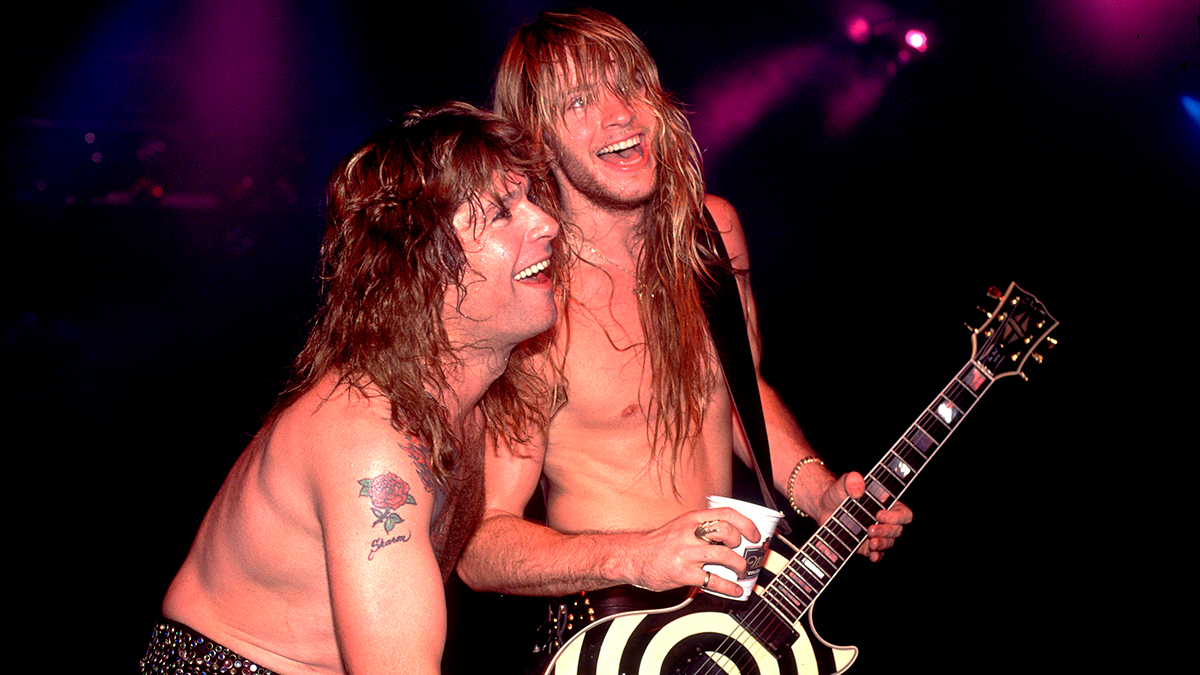Jennifer Batten on the sexism she faced as Michael Jackson's guitarist, and how Jeff Beck shaped her view of innovative guitar playing
The King of Pop's 10-year six-string sidekick talks playing guitar in a “man's world”, what keeps her loyal to Washburn, and the players impressing her today

Jennifer Batten established herself as a guitarist by remaining true to herself and her craft. In the words of Steve Vai, who knows a thing or two about the instrument, “the way she hammers, her technique, she’s obviously completely suited for the role of being a virtuoso guitar player.”
Rightfully so. Since her debut with Michael Jackson in 1987, and in the decades that have followed, Batten has refused to comprise her personal and musical integrity. It’s the bedrock upon which she has built her success.
This year promises a full calendar for the Oregon-based guitarist. “Michael passed over 10 years ago, and all of a sudden, almost all my foreign work, 80 percent of it, is tributes from different countries,” she says.
“I’ll be working with one based in Argentina, gigging in Spain in September, another based in France, one in the UK, and a Brazilian tribute artist I’ve toured with before is coming to the States for dates in New York, LA, and Orlando in June.
“I also have a three-week tour for my Italian agent that I’m doing as a trio, so there will be originals and covers and likely no Michael Jackson music at all in that one. In the summer I’ll be home with my cover band, Full Steam, doing local outdoor festivals.”

When you travel, you bring one guitar: your Washburn Parallaxe. What else is in the travel rig?
“I keep things fairly simple, and thank God it’s getting lighter and lighter. I’m using the BluGuitar AMP1. That’s a 3-pound, 100-watt amp that goes in my carry-on. For effects, I’m using the Line 6 HX Stomp XL and a MeloAudio MIDI Commander, one volume pedal, one expression pedal, and that’s it. That covers everything.
All the latest guitar news, interviews, lessons, reviews, deals and more, direct to your inbox!
“I just have to have them provide a cabinet when I arrive. The HX addition for multi-effects – I’ve been working on transferring over from my old set of gear for about three years because there are a couple of sounds in my DigiTech that the Line 6 can’t reproduce.
“I was using the old set for some gigs and the new set for other gigs until I finally made the entire transfer over to the HX, which is a much more powerful and versatile unit.”
I got poached by a guy at Washburn who took me out to lunch, told me everything I wanted to hear, and then promptly f**ked off to Fender!
You have a longstanding relationship with Washburn. Before that, you were with Ibanez.
“I signed with Ibanez in 1987, when I got the Michael Jackson tour. After seven years of seven Ibanez guitars with seven bad necks, the builder told me I had bad luck with necks, and I said, ‘There’s got to be something more reliable than that.’ Since I jumped ship, the Washburn necks have been very stable.”
How did the relationship with Washburn begin?
“I got poached by a guy who took me out to lunch, told me everything I wanted to hear, and then promptly fucked off to Fender! Many parts of everything I wanted to hear never happened, but I don’t like to be flaky with jumping companies all the time, and Washburn was good.
“I did a bunch of clinics for them around the world. I got super-intrigued by the Line 6 Variax, which allowed me to trigger acoustic sounds and various other guitar brand models and tunings, but I did come back when Dee Tatum, my guy at Washburn that I’ve known for many years, said, ‘I just came back from South America and they want you back down there. What do you say?’ So I did it.”

What keeps you loyal?
“Number one, it’s comfort. The first guitar they sent me, I thought, ‘I don’t know about this,’ but once I started playing it, it was super-comfortable.
“I’m not a person that has a ton of guitars at home. I have probably six or seven, and in general I only play one. I have three very close copies of the Parallaxe. In Full Steam, the singer takes everything down a half-step, so I’ve got one of those tuned down and my main one is standard tuning.
“I want a lightweight guitar, and my main one is fairly lightweight, considering it’s got a Floyd Rose, because that adds some weight. The neck has to be comfortable and not make me struggle.
“And then the sound. I’m pretty particular about pickups, and I didn’t like the pickups they originally sent me in the Parallaxe. I ended up with the Fishman Fluence after I heard Greg Koch. He’s got the greatest tone ever, and he’s got the Fluence loaded in his Les Pauls, his Strats, and his Telecasters, and I was really impressed with them all.
“There’s no better demo; nothing you can put in writing about a pickup is going to sell it like listening to somebody using them. Another selling point with the Fluence is that they’re very low noise. Nothing is worse than going into a club with bad electricity and getting a buzz through your system all night.”
What do you use for sessions when you’re tracking from home?
Engineers tend to use a cabinet as target practice. They will usually take a Shure SM57 and put it directly in the center of the cone, which is the worst sound you could possibly get
“I use the same gear. One thing I also use in the studio a lot is the BluGuitar BluBox. That thing is pretty incredible. It has 16 different IR cabinet emulations and a virtual mic placement knob. It depends on my mood if I'm going to use that or if I'm actually going to mic a cabinet.
“When I started Full Steam, I discovered Audix microphones. I was on a gig and the engineer had an Audix i5 on my cabinet, and because we are on in-ear monitors, I really noticed a difference. I actually take that mic on the road with me.
“Engineers tend to use a cabinet as target practice. They will usually take a Shure SM57 and put it directly in the center of the cone, which is the worst sound you could possibly get.
“The older I get, the more control I want, so I take my own mic and I angle it the way I want. And oftentimes, between soundcheck and the show, I see that they've gone up and put it back in the center of the cone, and [say] ‘You bastard!’ They think it's a mistake that it's hitting the paper instead of the center.
“Most guitar players don't love to have the mic’d cabs directly in their ears, but unless you have in-ear monitors, you don't know what people are hearing out front. You’re at the mercy of the sound engineer, who, if they're good, they're probably deaf because they've been doing it for so many years!”
![[L-R] Michael Jackson and Jennifer Batten](https://cdn.mos.cms.futurecdn.net/pSjQKVUvhATZdsDuZWNAUU.jpg)
You can't win.
“It's a struggle, for sure. I tell people I started at the top and I'm working my way down, because when I was on the Jackson tour, we got so lazy. Everything was worked out. Everything was beautiful.
“We’d just show up and go. We only played two or three days a week, so when you had a show day, you’d go [whines], ‘Oh, really? I wanted to go to the Roman Colosseum today.’ Now every day off is on a plane or train or automobile.”
Were the ’80s underrated? People snicker about “hair bands”, but some really good music came out of that time. Was the era as definitive as it was dismissed?
“I think it was a vibrant era. MTV helped elevate it to another level. And it was a really supreme guitar era energized by Van Halen. Every song had a guitar solo in it, which did not necessarily happen once Nirvana hit. So I have fond memories of it.
“Although I do still wear hairspray, I don't miss the extreme spray of those days. Every era has ridiculous fashion. You know, when you're in the fashion, you go, ‘Oh, I need those parachute pants! I must have those!’ 10 or 20 years later, you go, ‘Oh my god, I can't believe I wore that.’”
Everybody understands that, especially now with the music industry really scuffling, you need to figure out unique ways to get attention for your act
You are on four tracks on Jim Peterik & World Stage's Tigress: Women Who Rock The World. Respectfully to all involved, do you cringe at “tigress” or “guitar goddesses” or similar terminology?
“I don't, because I understand marketing and the dumb common denominator of what will reach people. People need labels to latch onto. You can get all exotic and have something super-creative that loses people, or you can dumb it down and go, ‘Here's a bunch of badass women playing,’ and make it super-obvious.
“Everybody understands that, especially now with the music industry really scuffling, you need to figure out unique ways to get attention for your act. Everybody can record at home, so there are thousands of records released every year. Eye of the Tiger was Jim's biggest hit [with Survivor], so to call it Tigress is along the same theme. It’s his project and he wrote most of the record, so it’s a smart tie-in.
“I was going to say, ‘However you can get out there, power to you getting attention for your music,’ but it immediately made me think of somebody I ran across on Instagram or TikTok who’s a pretty good female guitar player. I saw a post she did the other day. She's super-beautiful, she was playing in a bra, and I thought, ‘Man, you don't need to do that. You really don't. Plus, you're going to get fans that are not there for the music, and potentially stalkers.’ I find that whole side of it just sad.”
Having come up in the era of video babes and trade show booth babes and all of that, were you ever under that kind of pressure? Did anyone say, “If you just show a little more leg and flash a little more tits…”
“Yeah, I definitely did, and it was at the highest level: Frank DiLeo, who was Michael Jackson's manager. There were two incidents.
“I was already hired and things were going well. The first time, he goes, ‘Now that you have the gig, I could probably get you a spread in Playboy.’ I was horrified! I thought, ‘What the fuck are you... I'm a guitar player!’ It wasn't pressure. It's just something coming from his perspective that he thought was a big deal, because anybody around him just wants to be famous, however it takes to get there, and I was not of that ilk.
“Another time, we were somewhere in Europe at a party, and that bastard came up to me, he looked at my chest, and he goes, ‘You need some tits. I'll buy them for you.’ I think probably every woman in the industry has run into something like that at some point because it's a man's world. Women are making a lot of headway, but overall it's still a man's world with a man's perspective.”
When something like that happens and you have a job to hold on to, how do you handle it?
“Well, it wasn't an ultimatum. Again, he thought he was doing something positive, like, ‘I'll pay for those for you.’ And I'm like, ‘Oh, hell no.’ I probably smiled and walked away. It wasn't the kind of pressure like, ‘You have to do this to keep your job.’ It was like, ‘Yeah, Frank. Noted. And no, thanks.’”
When I was with Jeff Beck, I was in a studio while he was playing CDs that were sent to him. If he didn't hear something innovative in eight or 16 bars, it went in the trash
In a previous interview, you referred to, and I'm quoting here, “jaded fucks”. What is the secret to not becoming one?
“I consider myself a jaded fuck! And I have a very short attention span, partly thanks to the iPhone and social media. 20 years ago, when I was with Jeff Beck, I was in a studio while he was playing CDs that were sent to him.
“If he didn't hear something innovative in eight or 16 bars, it went in the trash. I was amazed to watch that. But he’s a guy that really invented electric guitar and a lot of what people are doing today, and he is always looking for innovation.
“Now I find that with myself. I watch the music acts on Colbert and I'm good for eight bars. If something doesn't grab me, it's like, ‘I heard that 40 years ago. What else have you got to offer?’ That's my definition of a jaded fuck.
“But having said that, there are people that really stand out. I immediately think of Mohini Dey, who is an absolute monster, and Tal Wilkenfeld, who is a stunning player. Mateus Asato and Lari Basilio also really grabbed my ear. I have the ultimate respect for them. They all have something new and exciting to offer.”
Given the state of the music industry, and the world, how do you take care of your mental health? Do you naturally go with the flow, or is it something you've had to work on?
“When lockdown came, I joined millions of other people that were not doing well at all. It was super-depressing. I had all these tours booked that were obviously canceled. I thought I was going to lose my house. My mental health was not good at the beginning of the pandemic, and it's been a little up and down since, depending on what's going on.
“I think so many people are so connected with their work, especially when it's art, like playing music, that when you're not allowed to do it, your entire identity goes to hell. It becomes, ‘Why am I on Earth? What is going on here?’
“A lot of people have gone through a serious reset, and I did as well. Ultimately, I don't take things as seriously as I did at one time. If I can make a living playing music, as long as it’s not a shit gig that I hate, I think I’m doing pretty well. When you’re young, you think you want to be rich and famous like Madonna or whoever your heroes are, and it's extremely unlikely to happen.
“The goal should be being happy with the day-to-day and making progress as a musician. That’s where real satisfaction happens. I have been there many times along the path and I'm really there now. It's about discovery, progress, and community. It's about being able to play and express yourself and connect with people. That's the best you can get.”
Alison Richter is a seasoned journalist who interviews musicians, producers, engineers, and other industry professionals, and covers mental health issues for GuitarWorld.com. Writing credits include a wide range of publications, including GuitarWorld.com, MusicRadar.com, Bass Player, TNAG Connoisseur, Reverb, Music Industry News, Acoustic, Drummer, Guitar.com, Gearphoria, She Shreds, Guitar Girl, and Collectible Guitar.

